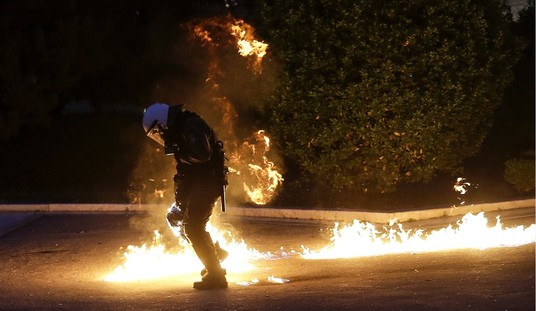According to the latest CBS poll, nearly 70 percent of Americans approve of President Obama’s decision to withdraw all combat troops from Iraq. In a remarkable turnaround, the Iraqis are the bigger opponents of the president’s plan. Iraqis want American soldiers to stay in their country more than Americans do.
A new poll by an Iraqi company found that nearly 60 percent feel it is the wrong time for U.S. soldiers to leave and 53 percent oppose President Obama’s ending of the combat mission. A little more than half believe the withdrawal will hurt the country and only one-fourth view the development positively. And in a statistic that is sure to bother those that boast of Obama’s worldwide popularity, nearly 42 percent feel the president does not care about the situation in Iraq.
Back in September 2006, the year when Iraq nearly fell to civil war, 71 percent of Iraqis wanted U.S. forces to leave their country in a year or less. There was a widespread perception that U.S. soldiers were the ones responsible for their misery. Most disturbingly, 61 percent of Iraqis felt attacks on U.S. soldiers were legitimate, a 14 percent increase from the beginning of 2006. But by March 2008, only 38 percent wanted U.S. forces to leave immediately and a majority wanted them to stay until the country was secured.
What happened? The surge is what happened. Contrary to what opponents of the surge said, the increased presence and aggressiveness of U.S. forces did not trigger a popular backlash because security visibly improved. The increased exposure to American forces likely also led to a certain degree of affection and respect as the anti-American myths were busted by reality.
The Iraqi anger against U.S. forces wasn’t inevitable. It was based on the fact that they were equated with occupation and anguish. Iraqis’ bitterness increased over the years as they assumed America was capable of getting their electricity working and providing them with safety but simply didn’t care to and therefore must have ulterior motives for being in Iraq. American soldiers were thus seen as the sources of instability.
When the surge brought security, a better working relationship with Iraqi citizens, and political and economic progress, their opinion turned around. This same dynamic seems to be happening in Afghanistan today. And now they want us there more than we want to be there.
A small, unrepresentative sampling of Iraqis from different areas of the country by the New York Times shows that many Iraqis are concerned and even feeling betrayed. And what they said indicates that President Obama can expect his approval rating to drop even faster in Iraq than it is in the United States.
“Not hearing Obama talking about Iran and their influence in Iraq makes us believe that America has sold us to Iran,” said Marwan Ahmed of Baghdad’s Sunni Adhamiya neighborhood.
Obama has already lost the support of those who feel the withdrawal is happening too soon, but he is going to lose even more as the perception grows that the U.S. is abandoning the country to Iran. Only 18 percent of Iraq’s Shiites, the sect most favorable to Iran, look positively upon Tehran’s role in their country. During the last election, the pro-Iran religious parties were massacred.
The victory of Iyad Allawi shows that one of the primary concerns of Iraqis is preventing their country from being dominated by Iran, whose regime is often blamed for the sectarian strife they are all fed up with. Yet there was no reassurance on this issue given in President Obama’s speech. Indeed, Iran was not even mentioned. Neither was Syria, whose officials Iraq sought to prosecute in a UN tribunal until it became clear the Obama administration wouldn’t support it.
The recent statement by Vice President Biden that Iranian influence in Iraq is “minimal,” followed by Ambassador Jeffrey’s remarks to the same effect (while at the same time estimating that one-fourth of U.S. casualties have been due to Iranian-backed groups) will only further convince Iraqis that the U.S. either doesn’t get it or doesn’t care. The Obama administration is trying to pre-empt critics who will say their policies are throwing Iraq to the wolves but in so doing will convince Iraqis that that’s exactly what’s happening.
Allawi and Prime Minister al-Maliki have unfortunately been unable to come to a compromise for a unity government as both want to be prime minister. Allawi now says that the U.S. is not supporting him because the Obama administration wants a government that is acceptable to Iran. Despite public reassurances to the contrary, this is an admission that Iran has significant say over Iraq’s future and a sign that the Obama administration naively believes our interests coincide and some sort of understanding can be reached.
The president believes taking a softer tone towards Iran will build support for the U.S. and improve our image, but Iraq is one place where it won’t work. It is fortunate that Iraqi public opinion has turned around in our favor, but if we are seen as leaving hastily and submitting to Iran, it will quickly reverse back to where it was. It was wise of President Obama to reiterate his commitment to the future of Iraq, but Iraqis will not believe him if they see Iran being catered to or an Iraqi government come to power that is hamstrung by Iran’s proxies. They will again see the U.S. as the party responsible for their desires being dashed; as being too uncaring, naïve, and/or weak to protect them from an Iran that is responsible for spilling both American and Iraqi blood. And they’ll be right.









Join the conversation as a VIP Member